高中英语介词知识点大汇总
高中介词的用法总结

高中介词的用法总结
高中英语中介词的用法总结如下:
1. 表示在某时间时,常用at、on、in等介词。
at常用来表示在具体的时间点前,如at 7:30;on用来表示在星期几、在某日以及在某一天的上午或下午,如on Monday、on March 1st等;in则常用来表示在一个较长的时间段里,如in the morning、in the afternoon、in a year等。
2. 表示地点时,常用in、at、over等介词。
in表示在一个范围内的某个地点,如in the field;at表示在一个具体的地点,如at the school gate;over则表示悬空或覆盖着某物,如over the table。
3. 表示方式时,常用by、with等介词。
by表示通过某种方式或手段,如by bus、by phone等;with则表示用某种工具或和某人一起做某事,如with a pen、with my friend。
4. 表示目的时,常用for、to等介词。
for表示为了某个目的而做某事,如for your help;to则表示某个动作的方向或指向,如to the school。
5. 表示比较时,常用than、as等介词。
than表示比较的对象,如I am taller than him;as则表示与某人或某物一样,如as tall as him。
以上是高中英语中介词的一些常见用法,希望对你有所帮助。
如果有任何疑问,建议咨询专业英语教师或者查阅英语语法书籍。
高中英语 介词汇总
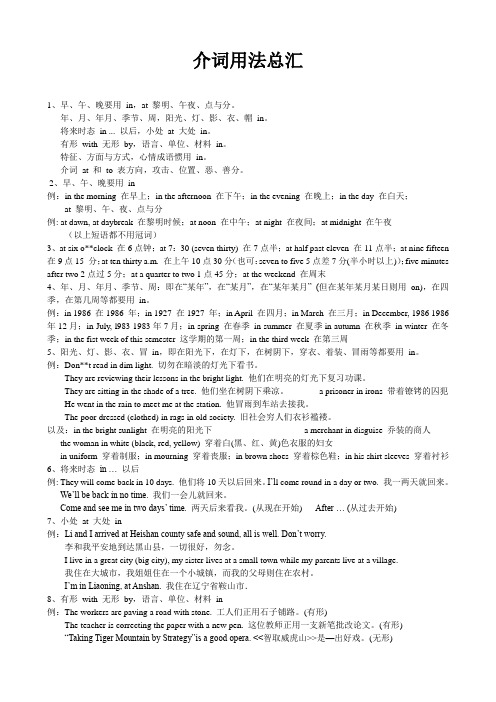
介词用法总汇1、早、午、晚要用in,at 黎明、午夜、点与分。
年、月、年月、季节、周,阳光、灯、影、衣、帽in。
将来时态in ... 以后,小处at 大处in。
有形with 无形by,语言、单位、材料in。
特征、方面与方式,心情成语惯用in。
介词at 和to 表方向,攻击、位置、恶、善分。
2、早、午、晚要用in例:in the morning 在早上;in the afternoon 在下午;in the evening 在晚上;in the day 在白天;at 黎明、午、夜、点与分例: at dawn, at daybreak 在黎明时候;at noon 在中午;at night 在夜间;at midnight 在午夜(以上短语都不用冠词)3、at six o**clock 在6点钟;at 7:30 (seven thirty) 在7点半;at half past eleven 在11点半;at nine fifteen 在9点15 分;at ten thirty a.m. 在上午10点30分(也可:seven to five 5点差7分(半小时以上));five minutes after two 2点过5分;at a quarter to two 1点45分;at the weekend 在周末4、年、月、年月、季节、周:即在“某年”,在“某月”,在“某年某月” (但在某年某月某日则用on),在四季,在第几周等都要用in。
例:in 1986 在1986 年;in 1927 在1927 年;in April 在四月;in March 在三月;in December, 1986 1986年12月;in July, l983 1983年7月;in spring 在春季in summer 在夏季in autumn 在秋季in winter 在冬季;in the fist week of this semester 这学期的第一周;in the third week 在第三周5、阳光、灯、影、衣、冒in,即在阳光下,在灯下,在树阴下,穿衣、着装、冒雨等都要用in。
高中英语介词归纳-超全!!
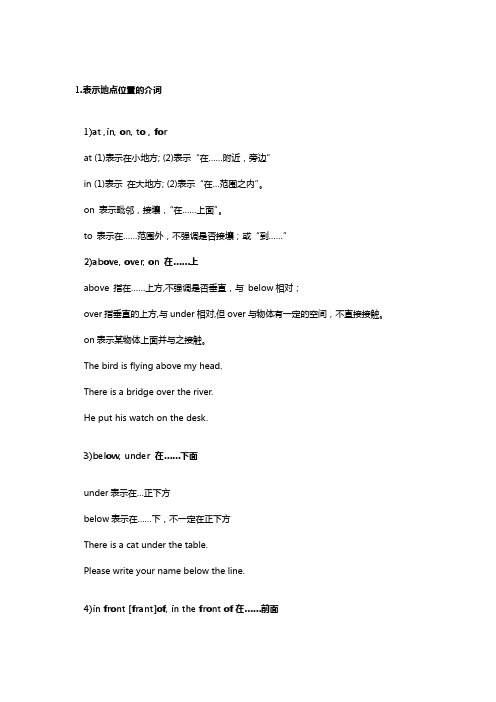
1.表示地点位置的介词1)at ,in, on, to,forat (1)表示在小地方; (2)表示“在……附近,旁边”in (1)表示在大地方; (2)表示“在…范围之内”。
on 表示毗邻,接壤,“在……上面”。
to 表示在……范围外,不强调是否接壤;或“到……”2)above, over, on 在……上above 指在……上方,不强调是否垂直,与below相对;over指垂直的上方,与under相对,但over与物体有一定的空间,不直接接触。
on表示某物体上面并与之接触。
The bird is flying above my head.There is a bridge over the river.He put his watch on the desk.3)below, under 在……下面under表示在…正下方below表示在……下,不一定在正下方There is a cat under the table.Please write your name below the line.4)in front [frant]of, in the front of在……前面in front of…意思是“在……前面”,指甲物在乙物之前,两者互不包括;其反义词是behind (在……的后面)。
There are some flowers in front of the house.(房子前面有些花卉。
)in the front of 意思是“在…..的前部”,即甲物在乙物的内部.反义词是at the back of…(在……范围内的后部)。
There is a blackboard in the front of our classroom.我们的教室前边有一块黑板。
Our teacher stands in the front of the classroom.我们的老师站在教室前.(老师在教室里)5)beside,behindbeside 表示在……旁边behind 表示在……后面本段2.表示时间的介词1)in , on,at 在……时in表示较长时间,如世纪、朝代、时代、年、季节、月及一般(非特指)的早、中、晚等。
高中英语知识点归纳介词短语与介词的固定搭配
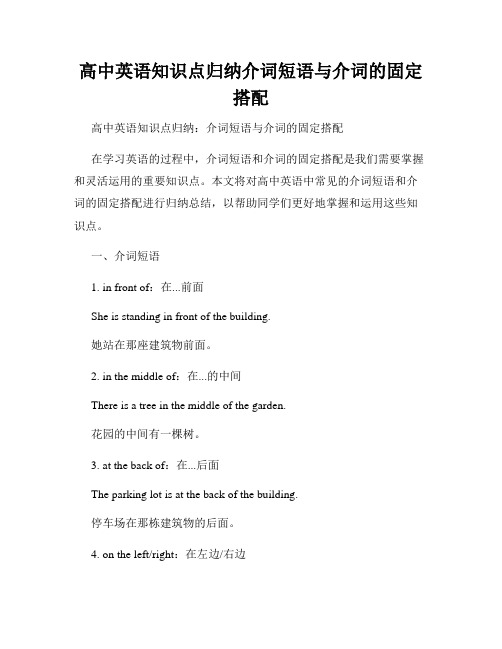
高中英语知识点归纳介词短语与介词的固定搭配高中英语知识点归纳:介词短语与介词的固定搭配在学习英语的过程中,介词短语和介词的固定搭配是我们需要掌握和灵活运用的重要知识点。
本文将对高中英语中常见的介词短语和介词的固定搭配进行归纳总结,以帮助同学们更好地掌握和运用这些知识点。
一、介词短语1. in front of:在...前面She is standing in front of the building.她站在那座建筑物前面。
2. in the middle of:在...的中间There is a tree in the middle of the garden.花园的中间有一棵树。
3. at the back of:在...后面The parking lot is at the back of the building.停车场在那栋建筑物的后面。
4. on the left/right:在左边/右边The library is on the left side of the main gate.图书馆在主门的左边。
5. next to:紧挨着,旁边My house is next to the supermarket.我的房子旁边是超市。
6. in the corner of:在...的角落There is a small coffee shop in the corner of the street.街角有一家小咖啡馆。
7. by the side of:在...旁边The hospital is by the side of the river.医院在河边。
8. at the end of:在...的尽头The classroom is at the end of the corridor.教室在走廊的尽头。
9. across from:在...的对面The supermarket is across from the post office.超市在邮局的对面。
高中英语:介词与介词短语语法知识点
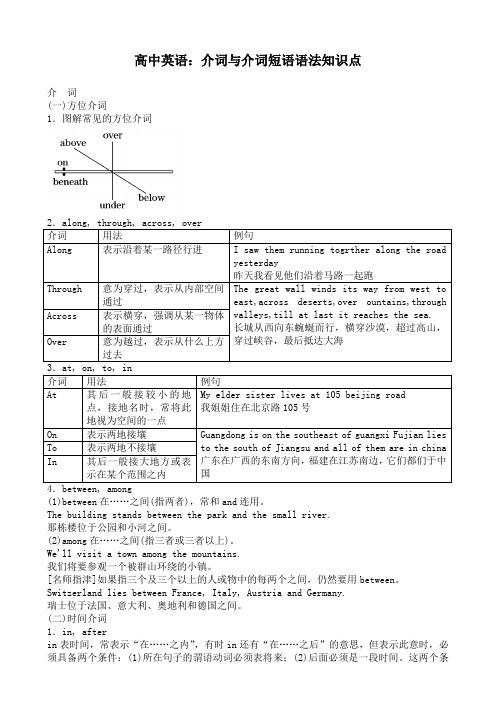
高中英语:介词与介词短语语法知识点介 词(一)方位介词1.图解常见的方位介词介词 用法例句 Along 表示沿着某一路径行进 I saw them running togrther along the roadyesterday昨天我看见他们沿着马路一起跑Through 意为穿过,表示从内部空间通过 The great wall winds its way from west toeast,across deserts,over ountains,through valleys,till at last it reaches the sea.长城从西向东蜿蜒而行,横穿沙漠,超过高山,穿过峡谷,最后抵达大海Across 表示横穿,强调从某一物体的表面通过Over 意为越过,表示从什么上方过去 介词 用法 例句At 其后一般接较小的地点,接地名时,常将此地视为空间的一点My elder sister lives at 105 beijing road我姐姐住在北京路105号On 表示两地接壤 Guangdong is on the southeast of guangxi Fujian liesto the south of Jiangsu and all of them are in china 广东在广西的东南方向,福建在江苏南边,它们都们于中国 To 表示两地不接壤In 其后一般接大地方或表示在某个范围之内(1)between 在……之间(指两者),常和and 连用。
The building stands between the park and the small river.那栋楼位于公园和小河之间。
(2)among 在……之间(指三者或三者以上)。
We'll visit a town among the mountains.我们将要参观一个被群山环绕的小镇。
[名师指津]如果指三个及三个以上的人或物中的每两个之间,仍然要用between 。
高中英语知识点归纳介词短语的用法和搭配
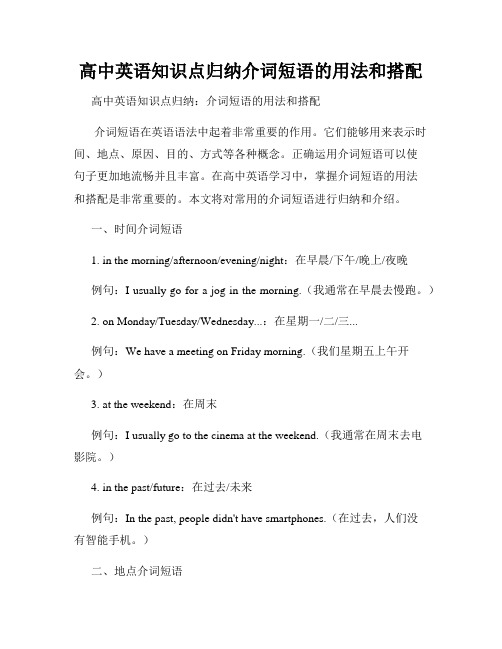
高中英语知识点归纳介词短语的用法和搭配高中英语知识点归纳:介词短语的用法和搭配介词短语在英语语法中起着非常重要的作用。
它们能够用来表示时间、地点、原因、目的、方式等各种概念。
正确运用介词短语可以使句子更加地流畅并且丰富。
在高中英语学习中,掌握介词短语的用法和搭配是非常重要的。
本文将对常用的介词短语进行归纳和介绍。
一、时间介词短语1. in the morning/afternoon/evening/night:在早晨/下午/晚上/夜晚例句:I usually go for a jog in the morning.(我通常在早晨去慢跑。
)2. on Monday/Tuesday/Wednesday...:在星期一/二/三...例句:We have a meeting on Friday morning.(我们星期五上午开会。
)3. at the weekend:在周末例句:I usually go to the cinema at the weekend.(我通常在周末去电影院。
)4. in the past/future:在过去/未来例句:In the past, people didn't have smartphones.(在过去,人们没有智能手机。
)二、地点介词短语1. at the park/school/home:在公园/学校/家里例句:I saw my friend at the park yesterday.(我昨天在公园见到了我的朋友。
)2. in the city/country:在城市/农村例句:I prefer living in the country rather than the city.(我更喜欢住在农村而不是城市。
)3. on the beach/mountain/river:在海滩/山上/河边例句:We had a picnic on the beach last Sunday.(上星期天我们在海滩上野餐。
(完整版)高中英语介词用法大全
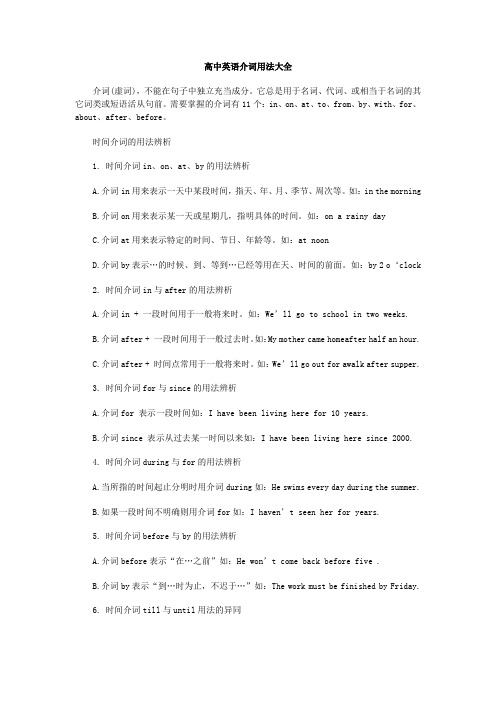
高中英语介词用法大全介词(虚词),不能在句子中独立充当成分。
它总是用于名词、代词、或相当于名词的其它词类或短语活从句前。
需要掌握的介词有11个:in、on、at、to、from、by、with、for、about、after、before。
时间介词的用法辨析1. 时间介词in、on、at、by的用法辨析A.介词in用来表示一天中某段时间,指天、年、月、季节、周次等。
如:in the morningB.介词on用来表示某一天或星期几,指明具体的时间。
如:on a rainy dayC.介词at用来表示特定的时间、节日、年龄等。
如:at noonD.介词by表示…的时候、到、等到…已经等用在天、时间的前面。
如:by 2 o‘clock2. 时间介词in与after的用法辨析A.介词in + 一段时间用于一般将来时。
如:We’ll go to school in two weeks.B.介词after + 一段时间用于一般过去时。
如:My mother came homeafter half an hour.C.介词after + 时间点常用于一般将来时。
如:We’ll go out for awalk after supper.3. 时间介词for与since的用法辨析A.介词for 表示一段时间如:I have been living here for 10 years.B.介词since 表示从过去某一时间以来如:I have been living here since 2000.4. 时间介词during与for的用法辨析A.当所指的时间起止分明时用介词during如:He swims every day during the summer.B.如果一段时间不明确则用介词for如:I haven’t seen her for years.5. 时间介词before与by的用法辨析A.介词before表示“在…之前”如:He won’t come back before five .B.介词by表示“到…时为止,不迟于…”如:The work must be finished by Friday.6. 时间介词till与until用法的异同A.till和until用在肯定句中,均可表示“直到…为止”,如:I will waittill(until)seveno'clock.B.till和until用在否定句中,均可表示“在…以前”或“直到…才”。
高中英语介词知识点总结

高中英语介词知识点总结高中英语介词知识1表时间的介词:about, around, before, by, at, after, in, on, between, during, for, from, since, till, until, within等。
1.表示时间先后的before,after和in。
before表示某一时刻之前和after表示某一时刻之后。
in一般表示“从现在或说话时刻算起某一段时间之后”,用于将来时。
after则表示以过去为起点的某一段时间之后,用于过去时。
“in+时间段"也可作”在……之内"解。
He will be back in a few days. 他几天之后就回来。
He left on Monday and returned after three days. 他星期一走的,三天后回来的。
It's difficult to draw a horse well in half an hour.半小时之内画好一匹马是困难的。
2.表示"时间延续"的for, from...tofor表示动作或状态延续的时间长度,谓语动词必须是延续性的。
而from...to...表示“从……到……”。
We have studied English for three years. 我们学英语已三年了。
My family lived in Beijing from 1996 to 1999.我家从1996年到1999年住在北京。
3.表示"时限"的介词since, from, by, until(till)since表示动作的起始点,其意是 "从……以来 ",常与完成时态连用。
from表示时间的起始点,其意是"从",常和一般过去时连用。
until(prep. & conj.)意为"直到……为止"。
高中英语知识点归纳介词短语

高中英语知识点归纳介词短语介词短语在高中英语学习中扮演着重要的角色。
它们在句子中起到修饰名词、动词或形容词的作用,帮助我们更准确地表达意思。
掌握常用的介词短语,对于理解和运用英语具有至关重要的意义。
本文将对高中英语中常见的介词短语进行归纳。
一、表示时间的介词短语1. in the morning/afternoon/evening:在早上/下午/晚上例如:I usually go jogging in the morning.2. on Monday/Tuesday...:在星期一/二...例如:We have a meeting on Monday.3. at the weekend:在周末例如:I always go shopping at the weekend.4. from...to...:从...到...例如:The library is open from 9am to 5pm.5. during the summer/winter/spring/autumn:在夏天/冬天/春天/秋天例如:I like swimming during the summer.二、表示地点的介词短语1. at school/home/work:在学校/家/工作例如:I study English at school.2. in the park/forest/restaurant:在公园/森林/餐厅例如:We had a picnic in the park last weekend.3. on the street/corner:在街上/拐角处例如:You can find a café on the corner.4. at the bus stop/train station/airport:在公交车站/火车站/机场例如:I will meet you at the airport.5. by the river/sea/lake:在河边/海边/湖边例如:Let's have a picnic by the lake.三、表示方式的介词短语1. by car/bus/train:乘坐汽车/公交车/火车例如:I usually go to work by bus.2. on foot:步行例如:The supermarket is just a few minutes' walk away. I usually go there on foot.3. with a smile/tears:带着微笑/眼泪例如:She accepted the award with a smile on her face.4. in a hurry/rush:匆忙地例如:I left the house in a hurry and forgot my umbrella.5. by oneself:独自地例如:He likes to travel by himself.四、表示原因的介词短语1. because of:因为例如:We couldn't go to the party because of the bad weather.2. due to:由于例如:The delay was due to the heavy traffic.3. thanks to:多亏了例如:Thanks to your help, we finished the project on time.4. as a result of:由于...的结果例如:As a result of their hard work, they won the competition.5. in order to:为了例如:He studied hard in order to pass the exam.五、表示目的的介词短语1. for the purpose of:为了...的目的例如:We organized a meeting for the purpose of discussing the new project.2. with the aim of:以...为目标例如:He started exercising with the aim of becoming healthier.3. in order to:为了例如:She saved money in order to buy a new car.4. so as to:以便例如:I woke up early so as to catch the first train.5. with a view to:考虑到例如:They made some changes with a view to improving the product.本文简要介绍了高中英语中常见的介词短语,旨在帮助学生提高对英语的理解和应用能力。
高中英语高考复习常用介词分类汇总(共两大类)
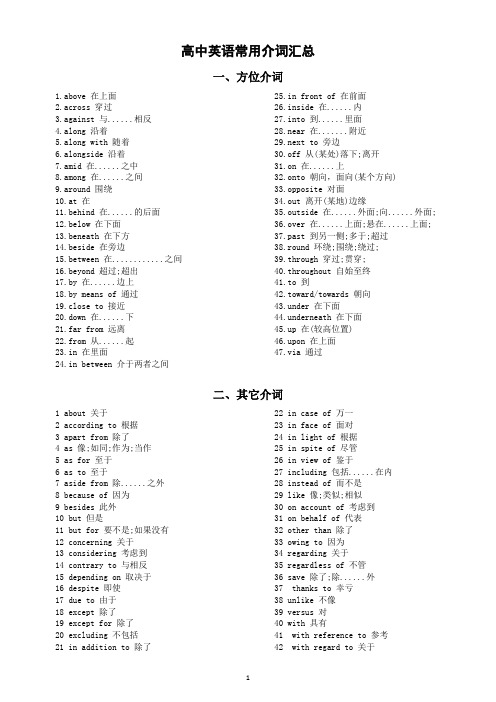
高中英语常用介词汇总一、方位介词1.above 在上面2.across 穿过3.against 与......相反4.along 沿着5.along with 随着6.alongside 沿着7.amid 在......之中8.among 在......之间9.around 围绕10.at 在11.behind 在......的后面12.below 在下面13.beneath 在下方14.beside 在旁边15.between 在............之间16.beyond 超过;超出17.by 在......边上18.by means of 通过19.close to 接近20.down 在......下21.far from 远离22.from 从......起23.in 在里面24.in between 介于两者之间25.in front of 在前面26.inside 在......内27.into 到......里面28.near 在.......附近29.next to 旁边30.off 从(某处)落下;离开31.on 在......上32.onto 朝向,面向(某个方向)33.opposite 对面34.out 离开(某地)边缘35.outside 在......外面;向......外面;36.over 在......上面;悬在......上面;37.past 到另一侧;多于;超过38.round 环绕;围绕;绕过;39.through 穿过;贯穿;40.throughout 自始至终41.to 到42.toward/towards 朝向43.under 在下面44.underneath 在下面45.up 在(较高位置)46.upon 在上面47.via 通过二、其它介词1 about 关于2 according to 根据3 apart from 除了4 as 像;如同;作为;当作5 as for 至于6 as to 至于7 aside from 除......之外8 because of 因为9 besides 此外10 but 但是11 but for 要不是;如果没有12 concerning 关于13 considering 考虑到14 contrary to 与相反15 depending on 取决于16 despite 即使17 due to 由于18 except 除了19 except for 除了20 excluding 不包括21 in addition to 除了22 in case of 万一23 in face of 面对24 in light of 根据25 in spite of 尽管26 in view of 鉴于27 including 包括......在内28 instead of 而不是29 like 像;类似;相似30 on account of 考虑到31 on behalf of 代表32 other than 除了33 owing to 因为34 regarding 关于35 regardless of 不管36 save 除了;除......外37 thanks to 幸亏38 unlike 不像39 versus 对40 with 具有41 with reference to 参考42 with regard to 关于1。
高中英语 常见的介词总结
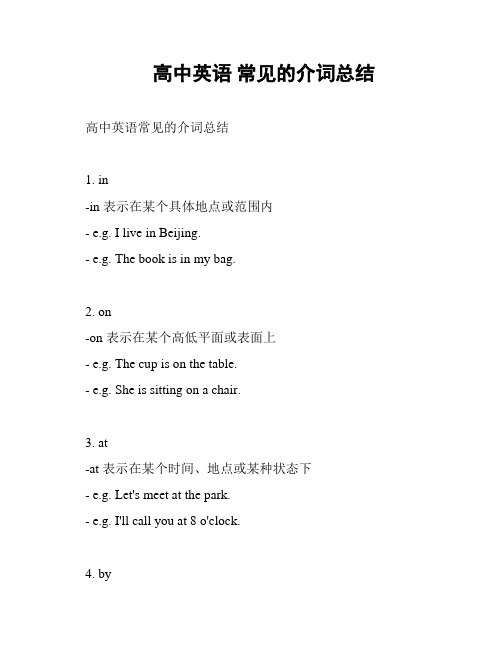
高中英语常见的介词总结高中英语常见的介词总结1. in-in 表示在某个具体地点或范围内- e.g. I live in Beijing.- e.g. The book is in my bag.2. on-on 表示在某个高低平面或表面上- e.g. The cup is on the table.- e.g. She is sitting on a chair.3. at-at 表示在某个时间、地点或某种状态下- e.g. Let's meet at the park.- e.g. I'll call you at 8 o'clock.4. by-by 表示通过某种方式、方法或交通工具- e.g. He goes to work by car.- e.g. Please send the document by email.5. for-for 表示为了某个目的、目标或对象- e.g. This gift is for you.- e.g. I bought this book for studying.6. with-with 表示和某个人、物或状态一起- e.g. I went to the park with my friends. - e.g. She is playing with her dog.7. of-of 表示属于、关于或由某人或事物引起- e.g. That is the book of my friend.- e.g. The story is about a detective.8. to-to 表示移动、方向或目的- e.g. Let's go to the library.- e.g. She gave a present to her sister.9. from-from 表示出发点、来源或关系起始- e.g. The letter is from my teacher.10. with-with 表示附带、伴随或使用某物- e.g. I want a coffee with milk.- e.g. He wrote the note with a pencil.这些是高中英语中常见的介词总结,希望能对你有所帮助。
高考高中英语核心语法详解 介词
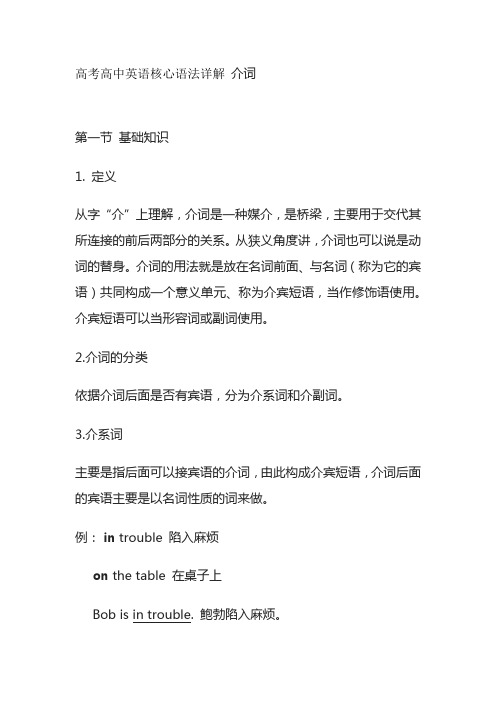
高考高中英语核心语法详解介词第一节基础知识1. 定义从字“介”上理解,介词是一种媒介,是桥梁,主要用于交代其所连接的前后两部分的关系。
从狭义角度讲,介词也可以说是动词的替身。
介词的用法就是放在名词前面、与名词(称为它的宾语)共同构成一个意义单元、称为介宾短语,当作修饰语使用。
介宾短语可以当形容词或副词使用。
2.介词的分类依据介词后面是否有宾语,分为介系词和介副词。
3.介系词主要是指后面可以接宾语的介词,由此构成介宾短语,介词后面的宾语主要是以名词性质的词来做。
例:in trouble 陷入麻烦on the table 在桌子上Bob is in trouble. 鲍勃陷入麻烦。
A red apple is on the table. 一个红苹果放在桌子上了。
4.介副词后面没有宾语,而是直接当副词使用。
Come in. 进来!The soldier stood up. 那名士兵站起来了。
5. 介副词和介词共同使用Mary went down to the basement. 玛丽去了地下室。
down 是介副词,后面没有宾语、直接修饰动词went;to 是介系词,后接名词词组the basement 当宾语、构成一个介词词组to the basement;went 看作不及物动词,后接介词to,再加宾语the basement;He has gone over to your office.over 是介副词,直接修饰动词has gone;to 是介词,后接名词词组your office 当宾语,构成一个介词词组to your office;gone看作不及物动词,后接介词to,再加宾语your office;第二节介系词在短语层面的应用介系词加宾语构成介宾短语后,主要出现在后修饰位置,其作用是交代中心词与其后的宾语之间的关系。
此时介宾短语也可视为形容词的性质。
例:a.2000 entry into the World Trade Organization2000年加入世贸b.an important earner of foreign exchange 赚取外汇的重要来源c. a boom in exports 出口增长第三节介系词在句子层面的应用1. 前状/后状:With the warm weather, the trees grow very well. 天气暖和,树木生长的很好!Kill two birds with one stone. 一石二鸟/一举两得。
高中英语高考介词用法总结(基本用法+具体用法)
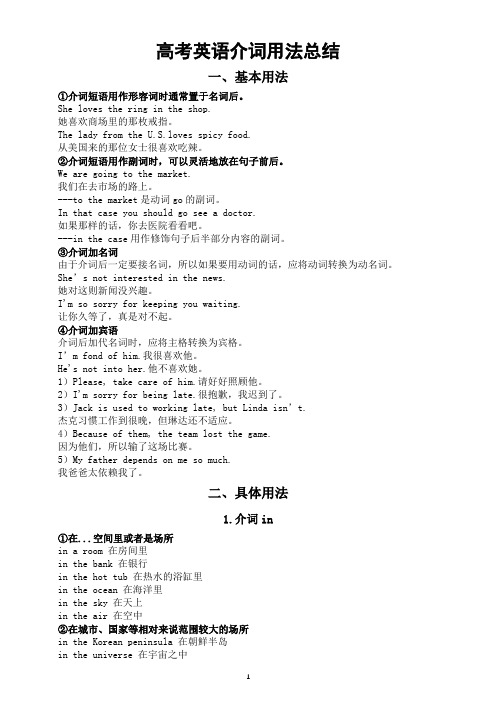
高考英语介词用法总结一、基本用法①介词短语用作形容词时通常置于名词后。
She loves the ring in the shop.她喜欢商场里的那枚戒指。
The lady from the U.S.loves spicy food.从美国来的那位女士很喜欢吃辣。
②介词短语用作副词时,可以灵活地放在句子前后。
We are going to the market.我们在去市场的路上。
---to the market是动词go的副词。
In that case you should go see a doctor.如果那样的话,你去医院看看吧。
---in the case用作修饰句子后半部分内容的副词。
③介词加名词由于介词后一定要接名词,所以如果要用动词的话,应将动词转换为动名词。
She’s not interested in the news.她对这则新闻没兴趣。
I'm so sorry for keeping you waiting.让你久等了,真是对不起。
④介词加宾语介词后加代名词时,应将主格转换为宾格。
I’m fond of him.我很喜欢他。
He's not into her.他不喜欢她。
1)Please, take care of him.请好好照顾他。
2)I'm sorry for being late.很抱歉,我迟到了。
3)Jack is used to working late, but Linda isn’t.杰克习惯工作到很晚,但琳达还不适应。
4)Because of them, the team lost the game.因为他们,所以输了这场比赛。
5)My father depends on me so much.我爸爸太依赖我了。
二、具体用法1.介词in①在...空间里或者是场所in a room 在房间里in the bank 在银行in the hot tub 在热水的浴缸里in the ocean 在海洋里in the sky 在天上in the air 在空中②在城市、国家等相对来说范围较大的场所in the Korean peninsula 在朝鲜半岛in the universe 在宇宙之中in the country 在乡村in the city 在城市里in Seoul 在首尔in Europe 在欧洲③年、月、季节等相对较长的时间in 2002 in the 1980sin March in springin winter in the 20th century④指早上、下午、晚上in the morning 在早上in the afternoon 在下午in the evening 在晚上对比: at noon 中午 at night 晚上⑤表示期间How could you finish he work in 3 days?这件事怎么可能在三天内完成?We can’t get to the island in 5 hours?我们不可能在五个小时之内到那个岛的。
高中英语中常见的介词用法总结
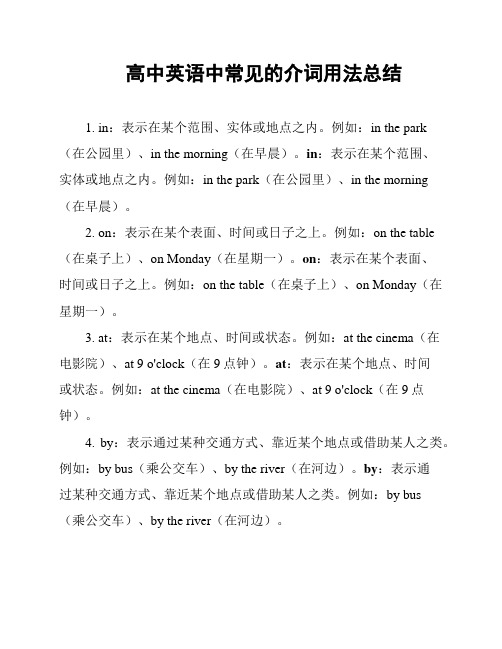
高中英语中常见的介词用法总结1. in:表示在某个范围、实体或地点之内。
例如:in the park(在公园里)、in the morning(在早晨)。
in:表示在某个范围、实体或地点之内。
例如:in the park(在公园里)、in the morning (在早晨)。
2. on:表示在某个表面、时间或日子之上。
例如:on the table (在桌子上)、on Monday(在星期一)。
on:表示在某个表面、时间或日子之上。
例如:on the table(在桌子上)、on Monday(在星期一)。
3. at:表示在某个地点、时间或状态。
例如:at the cinema(在电影院)、at 9 o'clock(在9点钟)。
at:表示在某个地点、时间或状态。
例如:at the cinema(在电影院)、at 9 o'clock(在9点钟)。
4. by:表示通过某种交通方式、靠近某个地点或借助某人之类。
例如:by bus(乘公交车)、by the river(在河边)。
by:表示通过某种交通方式、靠近某个地点或借助某人之类。
例如:by bus(乘公交车)、by the river(在河边)。
5. to:表示方向、目标或接触某物。
例如:go to school(去学校)、give it to me(给我)。
to:表示方向、目标或接触某物。
例如:go to school(去学校)、give it to me(给我)。
7. with:表示陪伴、带有某种特征或使用某物。
例如:play with friends(和朋友一起玩)、a book with a red cover(一本封面是红色的书)。
with:表示陪伴、带有某种特征或使用某物。
例如:play with friends(和朋友一起玩)、a book with a red cover(一本封面是红色的书)。
8. for:表示目的、目标或所属关系。
高考英语介词用法总结(完整)
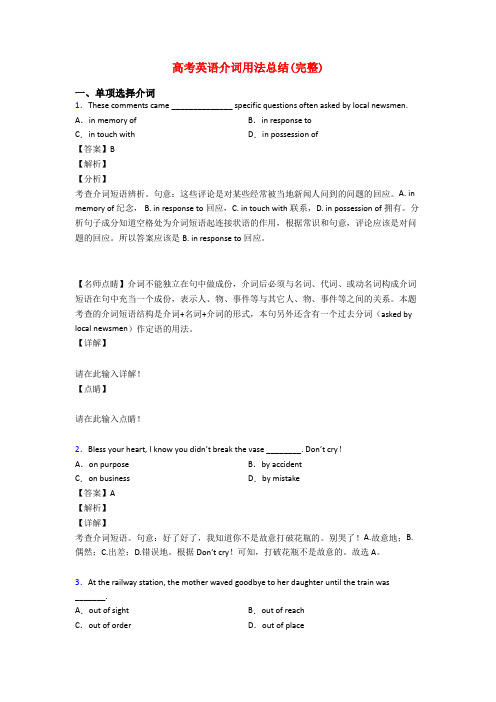
高考英语介词用法总结(完整)一、单项选择介词1.These comments came ______________ specific questions often asked by local newsmen. A.in memory of B.in response toC.in touch with D.in possession of【答案】B【解析】【分析】考查介词短语辨析。
句意:这些评论是对某些经常被当地新闻人问到的问题的回应。
A. in memory of 纪念, B. in response to回应,C. in touch with联系,D. in possession of拥有。
分析句子成分知道空格处为介词短语起连接状语的作用,根据常识和句意,评论应该是对问题的回应。
所以答案应该是B. in response to回应。
【名师点睛】介词不能独立在句中做成份,介词后必须与名词、代词、或动名词构成介词短语在句中充当一个成份,表示人、物、事件等与其它人、物、事件等之间的关系。
本题考查的介词短语结构是介词+名词+介词的形式,本句另外还含有一个过去分词(asked by local newsmen)作定语的用法。
【详解】请在此输入详解!【点睛】请在此输入点睛!2.Bless your heart, I know you didn’t break the vase ________. Don’t cry!A.on purpose B.by accidentC.on business D.by mistake【答案】A【解析】【详解】考查介词短语。
句意:好了好了,我知道你不是故意打破花瓶的。
别哭了!A.故意地;B.偶然;C.出差;D.错误地。
根据Don’t cry!可知,打破花瓶不是故意的。
故选A。
3.At the railway station, the mother waved goodbye to her daughter until the train was_______.A.out of sight B.out of reachC.out of order D.out of place【答案】A【解析】试题分析:考查介词短语辨析。
高中英语:介词与介词短语语法知识点

高中英语:介词与介词短语语法知识点介 词(一)方位介词1.图解常见的方位介词介词 用法例句 Along 表示沿着某一路径行进 I saw them running togrther along the roadyesterday昨天我看见他们沿着马路一起跑Through 意为穿过,表示从内部空间通过 The great wall winds its way from west toeast,across deserts,over ountains,through valleys,till at last it reaches the sea.长城从西向东蜿蜒而行,横穿沙漠,超过高山,穿过峡谷,最后抵达大海Across 表示横穿,强调从某一物体的表面通过Over 意为越过,表示从什么上方过去 介词 用法 例句At 其后一般接较小的地点,接地名时,常将此地视为空间的一点My elder sister lives at 105 beijing road我姐姐住在北京路105号On 表示两地接壤 Guangdong is on the southeast of guangxi Fujian liesto the south of Jiangsu and all of them are in china 广东在广西的东南方向,福建在江苏南边,它们都们于中国 To 表示两地不接壤In 其后一般接大地方或表示在某个范围之内(1)between 在……之间(指两者),常和and 连用。
The building stands between the park and the small river.那栋楼位于公园和小河之间。
(2)among 在……之间(指三者或三者以上)。
We'll visit a town among the mountains.我们将要参观一个被群山环绕的小镇。
[名师指津]如果指三个及三个以上的人或物中的每两个之间,仍然要用between 。
高中英语知识点归纳介词的用法与搭配

高中英语知识点归纳介词的用法与搭配高中英语知识点归纳:介词的用法与搭配介词在英语中起到连接词或短语之间关系的作用。
熟练掌握介词的用法与搭配对于理解和运用英语语法和表达非常重要。
下面是对高中英语中常用介词的用法与搭配进行归纳总结。
一、介词的基本用法1. of:表示所属关系、来源、构成等。
- The book of John is on the table.(约翰的书在桌子上。
)- The Statue of Liberty was a gift from France.(自由女神像是法国赠送的。
)2. in:表示位置、时间、状态等。
- He is in the room.(他在房间里。
)- I will see you in an hour.(我一个小时后会见你。
)3. to:表示目标、方向等。
- She went to the library to borrow some books.(她去图书馆借书。
) - Please give this letter to him.(请把这封信交给他。
)4. at:表示位置、时间等。
- We will meet at the park.(我们将在公园见面。
)- I have a meeting at 9 o'clock.(我9点有个会议。
)5. for:表示目的、原因等。
- I bought a gift for my friend's birthday.(我为我朋友的生日买了一份礼物。
)- He apologized for being late.(他为迟到而道歉。
)二、介词与名词的常见搭配1. on:- on the table(在桌子上)- on Monday(在星期一)2. in:- in the room(在房间里)- in the morning(在早上)3. at:- at the park(在公园)- at the party(在聚会上)4. to:- go to school(去上学)- talk to the teacher(和老师交谈)5. for:- a gift for her(给她的礼物)- thanks for your help(感谢你的帮助)三、介词与动词的常见搭配1. look at:看- He looked at the picture on the wall.(他看着墙上的画。
高中英语介词用法大全

高中英语介词用法大全介词(虚词),不能在句子中独立充当成分。
它总是用于名词、代词、或相当于名词的其它词类或短语活从句前。
需要掌握的介词有11个:in、on、at、to、from、by、with、for、about、after、before。
时间介词的用法辨析1. 时间介词in、on、at、by的用法辨析A.介词in用来表示一天中某段时间,指天、年、月、季节、周次等。
如:in the morningB.介词on用来表示某一天或星期几,指明具体的时间。
如:on a rainy dayC.介词at用来表示特定的时间、节日、年龄等。
如:at noonD.介词by表示…的时候、到、等到…已经等用在天、时间的前面。
如:by 2 o‘clock2. 时间介词in与after的用法辨析A.介词in + 一段时间用于一般将来时。
如:We’ll go to school in two weeks.B.介词after + 一段时间用于一般过去时。
如:My mother came homeafter half an hour.C.介词after + 时间点常用于一般将来时。
如:We’ll go out for awalk after supper.3. 时间介词for与since的用法辨析A.介词for 表示一段时间如:I have been living here for 10 years.B.介词since 表示从过去某一时间以来如:I have been living here since 2000.4. 时间介词during与for的用法辨析A.当所指的时间起止分明时用介词during如:He swims every day during the summer.B.如果一段时间不明确则用介词for如:I haven’t seen her for years.5. 时间介词before与by的用法辨析A.介词before表示“在…之前”如:He won’t come back before five .B.介词by表示“到…时为止,不迟于…”如:The work must be finished by Friday.6. 时间介词till与until用法的异同A.till和until用在肯定句中,均可表示“直到…为止”,如:I will waittill(until)seveno'clock.B.till和until用在否定句中,均可表示“在…以前”或“直到…才”。
- 1、下载文档前请自行甄别文档内容的完整性,平台不提供额外的编辑、内容补充、找答案等附加服务。
- 2、"仅部分预览"的文档,不可在线预览部分如存在完整性等问题,可反馈申请退款(可完整预览的文档不适用该条件!)。
- 3、如文档侵犯您的权益,请联系客服反馈,我们会尽快为您处理(人工客服工作时间:9:00-18:30)。
after
in指在一段时间之后,用于一般将来时,也可以指一段时间之=within;
after表示某一具体时间点之后,用于一般过去时。
①We’ll be back in three days.
②After seven the rain began to fall.
in the end
at the end of
①In the end they reached a place of safety.
②At the end of the road stands abeautiful garden.
③They decided to have an English evening at the end of this week.
by the end of
in the end作“最后”、“终于”解,单独作句子成分,后不接介词of;
at the end of表示“在……末梢”,“到……尽头”,既可指时间,也可以指地上或物体。不可单独使用;
by the endof作“在……结束时”,“到……末为止”解,只能指时间。不可单独使用。
②in the 1990s, in January
③on Monday, on a warm morning
since
from
since指从过去到现在的一段时间,和完成时连用;
from指从时间的某一点开始。
①We have not seen each other since 1995.
②I hope to do morning exercises from today.
③They don’t know the difference between wheat, rice and coin.
in
on
to
in表示在某围;
on指与什么毗邻;
to指在某围之外。
①Changchun is in the northeast of China.
②Mongolia is on the north of China.
What do you meanby doing such a thing?(表方法)
Nothing in the world could livewithout air or water.(表条件)
作表语
When I paid a visit to you yesterday, you were notat home.
介词短语的功能
例句
作定语
They didn’t findthe solutionto the problem.
作状语
We have breakfastat seven.(表时间)
They were late for the meetingbecause of the heavy rain.(表原因)
一.介词的分类
分类
特点
例词
简单介词
即一个介词
about, across, after, against, among, around, at, below,beyond, during, in, on等等。
合成介词
由两个介词构成的合成词
into, onto, throughout, upon, within
短语介词
由短语构成
according to, because of, instead of, up to, due to,owing to, thanks to等等。
双重介词
由两个介词搭配而成
from among, from behind, from under, till after, inbetween等等。
高中英语介词知识点大汇总
介词的英语全称为“preposition”是由“前缀pre-(在……前部)+position(位置)”构成的,所以又叫前置词。一般放在名词、代词或动名词的前面。
介词是虚词,主要用来表示人、物、事件等与其他人、物、事件之间的关系,如空间位置、时间先后、因果关系、方式方法等。
介词与其宾语构成介词短语。可作介词宾语的主要有名词、代词、动名词(或动名词短语)、名词性从句等。
④By the end of last month he had finished the novel.
位置
between
among
一般说来,between表示两者之间;
among用于三者或三者以上之间。
①You are to sit between your father and me.
②He is always happy among his classmates.
③Japan is to the east of China.
on
in
on只表示在某物的表面上,而用in表示占去某物一部分。
①There is a book
②There is an interesting article in the
newspaper.
注意:但有时说的虽然是三个以上的人或东西,强调的是两两相互间接关系时、在谈到一些事物或一组事物,而把它们视为分居两边时以及在谈事物间的差别时,要用between。
①Agreements were made between the
different countries.
②The little valley lies between highmountains.
分词介词
由现在分词转化而来
considering(就……而论),including,regarding,concerning等。
兼类介词
由形容词直接转化而来
like, unlike, near, next,opposite等等。
二.介词短语的语法功能
介词不能独立在句中做成份,介词后必须与名词、代词、或动名词构成介词短语在句中充当一个成分,表示人、物、事件等与其它人、物、事件等之间的关系。
作宾语补足语
I found the old buildingin a bad condition.
三.表示相同或相似概念的介词(短语)的区别
表示的概念
介词(短语)
区别
例子
时间
in
on
at
at在一个时间点上;
in在一段时间之;
on在具体某一天或具体的上午、下午、晚上。
①at 8 o'clock, at noon
